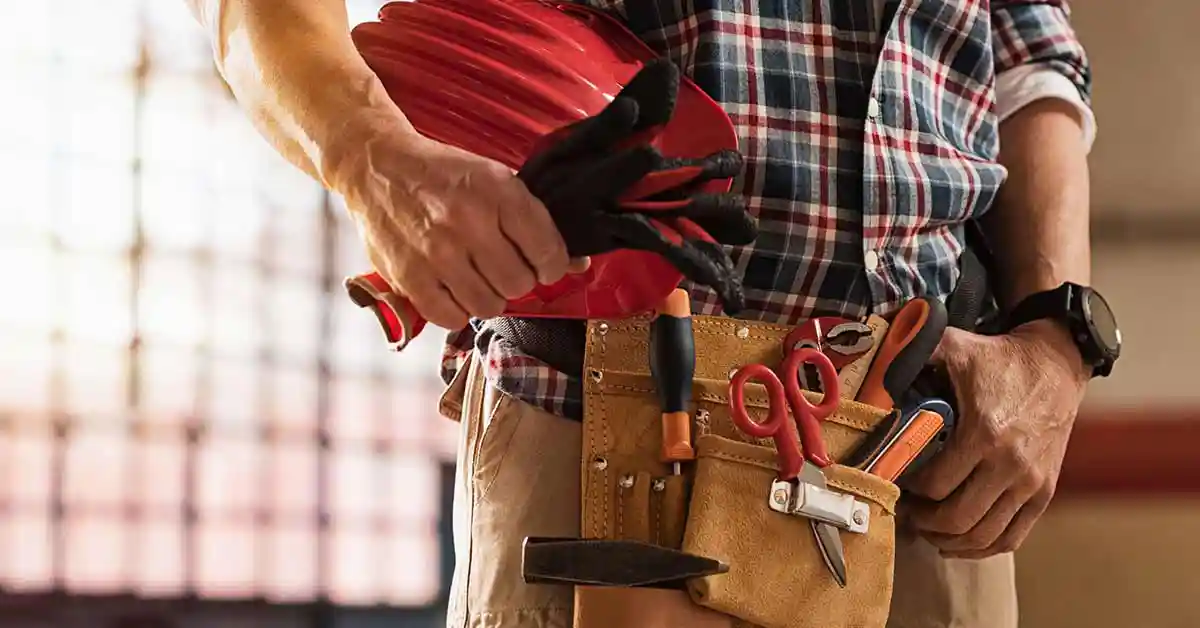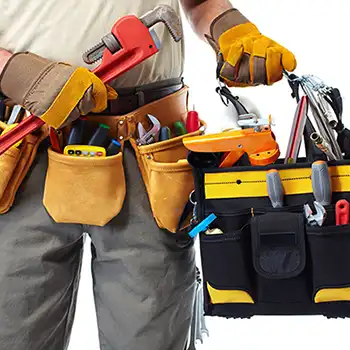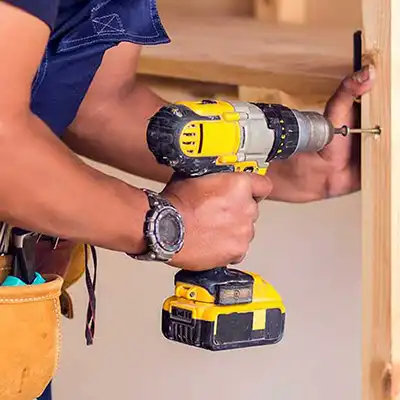
Welcome to our comprehensive guide on how to become a licensed handyman and grow your business. We will cover what you need to know in this article. We will discuss licensing requirements and marketing strategies. This will help you succeed in the handyman industry.
Handyman Licensing Requirements
Before you start your journey, it's essential to understand the licensing requirements for handymen in your area. Regulations can vary significantly by state, county, or city. Some locations may have specific handyman requirements for a license, while others might need a general contractor's license.
Research your area's licensing requirements, including any necessary examinations, educational prerequisites, and experience qualifications. Additionally, consider the list of Handyman services you plan to offer. Certain specialized services may demand additional licenses or permits.
How to find your Local Licensing Requirements
Search the term "your state contractors board" in Google, and your local contractors board website should pop right up.
In several states, the city or county manages contracting laws instead of the state. In that case, you might have to do some digging around. Try searching keywords such as:
- "Handyman license [your state]"
- "Construction law in [your city]"
- "Contractor’s license in [your state or county]"
- "Handyman exemption in [your city, state or county]"
- "[your state] contractors board"
- "Handyman license and insured in my area"
After you find the licensing laws for your area, read the rules that control handyman work carefully. Note that many states don’t use the word handyman. They have no handyman licenses or laws that reference the word handyman. In that case, focus on researching laws for contractors.
Try our Handyman Software to help manage your business
Steps to Obtain a Handyman License
Follow these steps to acquire your handyman contractor license and establish a legitimate business. Also, review our article on how to start a handyman business
- Verify Local Licensing Requirements: Confirm the specific requirements in your jurisdiction by contacting the local licensing board or agency.
- Obtain an Employer Identification Number (EIN): Register with the IRS to receive your EIN, a unique identifier used for tax purposes.
- Register Your Business: Establish your business entity, such as a sole proprietorship, partnership, or limited liability company (LLC), and register it with the appropriate state agency. For example, research handyman LLC requirements and the cost to get a handyman license and set up your business
- Complete Licensing Requirements: Meet the required steps for your field. This may include passing a handyman license exam, gaining experience, or finishing an accredited training course.
- Submit Your Application: Research the handyman license cost and renewal fees. Then, apply by sending the needed documents and application fees to the local contractor state license board or agency.
- Stay Compliant: Ensure you remain compliant by maintaining any necessary insurance, bonding, and continuing handyman license exams.

State-by-State Handyman Licensing Requirements
Below is an overview of the handyman licensing requirements for each state. Remember that rules can differ from state to state. Make sure to check the latest information with your local licensing board or agency.
Alabama
Alabama does not require a handyman license for minor repairs and maintenance. However, if the project's value exceeds $50,000 or involves electrical or plumbing work, a general contractor's license is necessary.
Alaska
In Alaska, a handyman must hold a general contractor's license if the project value is over $10,000. Or if the work involves electrical or plumbing or mechanical systems.
Arizona
Arizona requires a handyman to obtain a contractor's license if the project value exceeds $1,000. Or involves any electrical or plumbing or HVAC work.
Arkansas
Arkansas does not mandate a handyman license for general repair and maintenance. However, projects valued over $20,000 or involving specialized trades require a contractor's license.
California
In California, a handyman must obtain a contractor's license for projects valued over $500, including labor and materials. Electrical and plumbing and HVAC work also require specific licenses.
Colorado
Colorado does not have a statewide handyman licensing requirement. However, check with your local municipality for any specific regulations or permits.
Connecticut
Connecticut requires a home improvement contractor's license for projects valued over $1,000. For electrical and plumbing and HVAC work, specialized licenses are necessary.
Delaware
Delaware mandates a handyman to hold a home improvement contractor's license for projects valued over $50,000. Electrical and plumbing and HVAC work require specific licenses.
Florida
In Florida, a handyman must obtain a local occupational license and a county or city contractor's license for projects valued over $1,000. Electrical and plumbing and HVAC work require state-issued licenses.
Georgia
Georgia does not require a handyman license for general maintenance and repair. You need a residential or general contractor's license for projects worth more than $2,500. Electrical, plumbing, and HVAC work also need special licenses.
Hawaii
In Hawaii, a handyman must obtain a general contractor's license for projects valued over $1,000 or involving structural changes. Electrical and plumbing and HVAC work require specific licenses.
Idaho
Idaho does not require a statewide handyman business license. However, check with your local city or town for any specific rules or permits. Electrical and plumbing and HVAC work require specific licenses.
Illinois
Illinois does not require a statewide handyman license, but some local municipalities may have their own regulations. Electrical and plumbing and HVAC work require specific licenses.
Indiana
Indiana does not have a statewide handyman licensing requirement. However, check with your local municipality for any specific regulations or permits. Electrical, plumbing, and HVAC work require specific licenses.
Iowa
Iowa does not require a statewide handyman license, but some local municipalities may have their own regulations. Electrical, plumbing, and HVAC work require specific licenses.
Kansas
Kansas does not have a statewide handyman licensing requirement. However, check with your local municipality for any specific regulations or permits. Electrical, plumbing, and HVAC work require specific licenses.
Kentucky
Kentucky does not require a statewide handyman license, but some local municipalities may have their own regulations. Electrical, plumbing, and HVAC work require specific licenses.
Louisiana
In Louisiana, a handyman must obtain a home improvement registration for projects valued between $7,500 and $75,000. Electrical, plumbing, and HVAC work require specific licenses.
Maine
Maine does not require a statewide handyman license, but some local municipalities may have their own regulations. Electrical, plumbing, and HVAC work require specific licenses.
Maryland
In Maryland, a handyman must obtain a home improvement contractor's license for projects valued over $500. Electrical, plumbing, and HVAC work require specific licenses.
Massachusetts
Massachusetts requires a home improvement contractor's registration for projects valued over $1,000. Electrical, plumbing, and HVAC work require specific licenses.
Michigan
In Michigan, a handyman needs a license for projects worth more than $600. This can be a residential builder or maintenance and alteration contractor's license. Electrical, plumbing, and HVAC work require specific licenses.
Minnesota
Minnesota requires a residential building contractor or remodeler license for projects valued over $15,000. Electrical, plumbing, and HVAC work require specific licenses.
Mississippi
Mississippi does not require a handyman license for general maintenance and repair. You need a residential builder or remodeler license for projects worth more than $10,000. Also, electrical, plumbing, and HVAC work need special licensed handy man.
Missouri
Missouri does not have a statewide handyman licensing requirement. However, check with your local municipality for any specific regulations or permits. Electrical, plumbing, and HVAC work require specific licenses.
Montana
Montana does not require a statewide handyman license, but some local municipalities may have their own regulations. Electrical, HVAC and plumbing work require specific licenses.
Nebraska
Nebraska does not have a statewide handyman licensing requirement. However, check with your local municipality for any specific regulations or permits. Electrical, plumbing, and HVAC work require specific licenses.
Nevada
In Nevada, a handyman must obtain a contractor's license for projects valued over $1,000. Or involving framing, electrical, plumbing, or HVAC work.
New Hampshire
New Hampshire does not require a statewide handyman license, but some local municipalities may have their own regulations. Electrical, plumbing, and HVAC work require specific licenses.
New Jersey
In New Jersey, a handyman must obtain a home improvement contractor's registration for projects valued over $500. Electrical, plumbing, and HVAC work require specific licenses.
New Mexico
New Mexico requires a general construction or specialty contractor's license for projects valued over $7,200. Electrical, plumbing, and HVAC work require specific licenses.
New York
New York does not have a statewide handyman licensing requirement. However, check with your local municipality for any specific regulations or permits. HVAC, electrical and plumbing work require specific licenses.
North Carolina
North Carolina requires a general contractor's license for projects valued over $30,000. Electrical, plumbing, and HVAC work require specific licenses.
North Dakota
North Dakota requires a contractor's license for projects valued over $4,000. Electrical, plumbing, and HVAC work require specific licenses.
Ohio
Ohio does not require a statewide handyman license, but some local municipalities may have their own regulations. Electrical, plumbing, and HVAC work require specific licenses.
Oklahoma
Oklahoma does not have a statewide handyman licensing requirement. However, check with your local municipality for any specific regulations or permits. Electrical, plumbing, and HVAC work require specific licenses.
Oregon
In Oregon, a handyman must obtain a residential contractor's license for projects valued over $1,000. Electrical, plumbing, and HVAC work require specific licenses.
Pennsylvania
Pennsylvania requires a home improvement contractor's registration for projects valued over $5,000. Electrical, plumbing, and HVAC work require specific licenses.
Rhode Island
Rhode Island mandates a handyman to hold a residential contractor's registration for projects valued over $1,000. Plumbing and electrical and HVAC work require specific licenses.
South Carolina
South Carolina requires a residential builder or specialty contractor's license for projects valued over $5,000. Electrical, plumbing, and HVAC work require specific licenses.
South Dakota
South Dakota does not have a statewide handyman licensing requirement. However, check with your local municipality for any specific regulations or permits. Electrical, plumbing, and HVAC work require specific licenses.
Tennessee
Tennessee requires a home improvement contractor's license for projects valued between $3,000 and $24,999. For projects over $25,000, you need a general contractor's license. Electrical, plumbing, and HVAC work require specific licenses.
Texas
Texas does not have a statewide handyman licensing requirement. However, check with your local municipality for any specific regulations or permits. Electrical, plumbing, and HVAC work require specific licenses.
Utah
In Utah, a handyman must obtain a contractor's license for projects valued over $3,000, including labor and materials. Electrical, plumbing, and HVAC work require specific licenses.
Vermont
Vermont does not require a statewide handyman license, but some local municipalities may have their own regulations. Electrical, plumbing, and HVAC work require specific licenses.
Virginia
In Virginia, a handyman must obtain a contractor's license for projects valued over $1,000. Electrical, plumbing, and HVAC work require specific licenses.
Washington
Washington requires a handyman to hold a general contractor's registration for all projects. Electrical work requires a specific license, while plumbing and HVAC work may require specific licenses depending on the scope.
West Virginia
West Virginia requires a contractor's license for projects valued over $2,500. Electrical, plumbing, and HVAC work require specific licenses.
Wisconsin
Wisconsin does not require a statewide handyman license, but some local municipalities may have their own regulations. Electrical, plumbing, and HVAC work require specific licenses.
Wyoming
Wyoming does not have a statewide handyman licensing requirement. However, check with your local municipality for any specific regulations or permits. Electrical, plumbing, and HVAC work require specific licenses.

Insurance and Bonding
Protecting your business with the right insurance and bonding is crucial. Here are the most common types of insurance coverage for handymen:
- General Liability Insurance: Covers claims related to bodily injury, property damage, and personal injury caused by your business operations.
- Workers Compensation Insurance: Provides support to employees who suffer injuries or illnesses because of their job. This includes help with medical costs and lost pay.
- Commercial Auto Insurance: Covers damages caused by accidents involving your business vehicles.
In addition to insurance, obtaining a surety bond may be necessary, depending on your area's regulations. A surety bond ensures you will meet your contract obligations. It also protects your clients from financial loss caused by your actions.
Just starting? Try our free Handyman PDF Template for estimates
Continuing Education and Certification
Taking continuing education and earning handyman certifications keeps your skills current. It also helps you stand out from the competition.
- Industry Associations: Join organizations like the Association of Certified Handyman Professionals (ACHP) to access resources, networking opportunities, and continuing education courses.
- Certification Programs: Obtain specialized certifications, such as the Occupational Safety and Health Administration (OSHA) certification, to demonstrate your expertise and commitment to safety.
- Trade Shows and Conferences: Attend industry events to stay informed on the latest trends, tools, and best practices.
Conclusion
Getting a handyman license and managing your handyman business needs a good understanding of several key areas. You must know the licensing requirements, insurance, and bonding. You also need to learn handyman marketing strategies. Additionally, you should be familiar with essential handyman tools and equipment.
Ongoing professional development is important too. By following the advice in this guide, you will be on your way to starting a successful handyman business.
